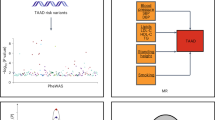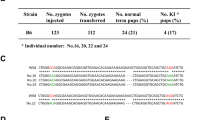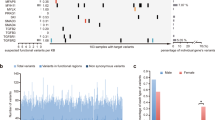Abstract
Thoracic aortic aneurysms and dissections (TAAD) is a serious condition with high morbidity and mortality. It is estimated that 20% of non-syndromic TAAD cases are inherited in an autosomal-dominant pattern with variable expression and reduced penetrance. Mutations in myosin heavy chain 11 (MYH11), one of several identified TAAD genes, were shown to simultaneously cause TAAD and patent ductus arteriosus (PDA). We identified two large Dutch families with TAAD/PDA and detected two different novel heterozygote MYH11 variants in the probands. These variants, a heterozygote missense variant and a heterozygote in-frame deletion, were predicted to have damaging effects on protein structure and function. However, these novel alterations did not segregate with the TAAD/PDA in 3 out of 11 cases in family TAAD01 and in 2 out of 6 cases of family TAAD02. No mutation was detected in other known TAAD genes. Thus, it is expected that within these families other genetic factors contribute to the disease either by themselves or by interacting with the MYH11 variants. Such an oligogenic model for TAAD would explain the variable onset and progression of the disorder and its reduced penetrance in general. We conclude that in familial TAAD/PDA with an MYH11 variant in the index case caution should be exercised upon counseling family members. Specialized surveillance should still be offered to the non-carriers to prevent catastrophic aortic dissections or ruptures. Furthermore, our study underscores that segregation analysis remains very important in clinical genetics. Prediction programs and mutation evaluation algorithms need to be interpreted with caution.
Similar content being viewed by others
Log in or create a free account to read this content
Gain free access to this article, as well as selected content from this journal and more on nature.com
or
References
Lilienfeld DE, Gunderson PD, Sprafka JM, Vargas C : Epidemiology of aortic aneurysms: I. Mortality trends in the United States, 1951 to 1981. Arteriosclerosis 1987; 7: 637–643.
Lindsay J : Diagnosis and treatment of diseases of the aorta. Curr Probl Cardiol 1997; 22: 485–542.
Guo DC, Papke CL, He R, Milewicz DM : Pathogenesis of thoracic and abdominal aortic aneurysms. Ann N Y Acad Sci 2006; 1085: 339–352.
El-Hamamsy I, Yacoub MH : Cellular and molecular mechanisms of thoracic aortic aneurysms. Nat Rev Cardiol 2009; 6: 771–786.
Ince H, Nienaber CA : Etiology, pathogenesis and management of thoracic aortic aneurysm. Nat Clin Pract Cardiovasc Med 2007; 4: 418–427.
Lindsay ME, Dietz HC : Lessons on the pathogenesis of aneurysm from heritable conditions. Nature 2011; 473: 308–316.
van de Laar IM, Oldenburg RA, Pals G et al: Mutations in SMAD3 cause a syndromic form of aortic aneurysms and dissections with early-onset osteoarthritis. Nat Genet 2011; 43: 121–126.
Albornoz G, Coady MA, Roberts M et al: Familial thoracic aortic aneurysms and dissections – incidence, modes of inheritance, and phenotypic patterns. Ann Thorac Surg 2006; 82: 1400–1405.
Milewicz DM, Chen H, Park ES et al: Reduced penetrance and variable expressivity of familial thoracic aortic aneurysms/dissections. Am J Cardiol 1998; 82: 474–479.
Wang L, Guo DC, Cao J et al: Mutations in myosin light chain kinase cause familial aortic dissections. Am J Hum Genet 2010; 87: 701–707.
Regalado ES, Guo DC, Villamizar C et al: Exome sequencing identifies SMAD3 mutations as a cause of familial thoracic aortic aneurysm and dissection with intracranial and other arterial aneurysms. Circ Res 2011; 109: 680–686.
Hiratzka LF, Bakris GL, Beckman JA et al: 2010 ACCF/AHA/AATS/ACR/ASA/SCA/SCAI/SIR/STS/SVM Guidelines for the diagnosis and management of patients with thoracic aortic disease. A Report of the American College of Cardiology Foundation/American Heart Association Task Force on Practice Guidelines, American Association for Thoracic Surgery, American College of Radiology, American Stroke Association, Society of Cardiovascular Anesthesiologists, Society for Cardiovascular Angiography and Interventions, Society of Interventional Radiology, Society of Thoracic Surgeons,and Society for Vascular Medicine. J Am Coll Cardiol 2010; 55: e27–e129.
Zhu L, Vranckx R, Khau Van Kien P et al: Mutations in myosin heavy chain 11 cause a syndrome associating thoracic aortic aneurysm/aortic dissection and patent ductus arteriosus. Nat Genet 2006; 38: 343–349.
Guo DC, Pannu H, Tran-Fadulu V et al: Mutations in smooth muscle alpha-actin (ACTA2) lead to thoracic aortic aneurysms and dissections. Nat Genet 2007; 39: 1488–1493.
Pannu H, Tran-Fadulu V, Papke CL et al: MYH11 mutations result in a distinct vascular pathology driven by insulin-like growth factor 1 and angiotensin II. Hum Mol Genet 2007; 16: 2453–2462.
Milewicz DM, Guo DC, Tran-Fadulu V et al: Genetic basis of thoracic aortic aneurysms and dissections: focus on smooth muscle cell contractile dysfunction. Annu Rev Genomics Hum Genet 2008; 9: 283–302.
Slomp J, Gittenberger-de Groot AC, Glukhova MA et al: Differentiation, dedifferentiation, and apoptosis of smooth muscle cells during the development of the human ductus arteriosus. Arterioscler Thromb Vasc Biol 1997; 17: 1003–1009.
Sheil ML, Jenkins O, Sholler GF : Echocardiographic assessment of aortic root dimensions in normal children based on measurement of a new ratio of aortic size independent of growth. Am J Cardiol 1995; 75: 711–715.
Prakash SK, LeMaire SA, Guo DC et al: Rare copy number variants disrupt genes regulating vascular smooth muscle cell adhesion and contractility in sporadic thoracic aortic aneurysms and dissections. Am J Hum Genet 2010; 87: 743–756.
Kuang SQ, Guo DC, Prakash SK et al: Recurrent chromosome 16p13.1 duplications are a risk factor for aortic dissections. PLoS Genet 2011; 7: e1002118.
Vermeesch JR, Fiegler H, de Leeuw N et al: Guidelines for molecular karyotyping in constitutional genetic diagnosis. Eur J Hum Genet 2007; 15: 1105–1114.
Abecasis GR, Cherny SS, Cookson WO, Cardon LR : Merlin – rapid analysis of dense genetic maps using sparse gene flow trees. Nat Genet 2002; 30: 97–101.
Ng AS, Vlietstra RE, Danielson GK, Smith HC, Puga FJ : Patent dusctus arteriosus in patients more than 50 years old. Int J Cardiol 1986; 11: 277–285.
Acknowledgements
We are grateful to the patients and their relatives who participated in our study. We thank Drs E van Binsbergen for array-CGH analysis. Our research was supported by a grant from the foundation Nuts Ohra (SNO-T-0701-101). AF Baas was supported by a grant from the Dr E Dekker Program of the Netherlands Heart Foundation (2009T001). X Jeunemaitre is supported by grants from ANR (n°10-02, GDPM2) and from the European FP7 through the FAD integrated project (Fighting Aneurysmal Disease, HEALTH-F2-2008-200647).
Author information
Authors and Affiliations
Corresponding author
Ethics declarations
Competing interests
The authors declare no conflict of interest.
Additional information
Supplementary Information accompanies the paper on European Journal of Human Genetics website
Supplementary information
Rights and permissions
About this article
Cite this article
Harakalova, M., van der Smagt, J., de Kovel, C. et al. Incomplete segregation of MYH11 variants with thoracic aortic aneurysms and dissections and patent ductus arteriosus. Eur J Hum Genet 21, 487–493 (2013). https://doi.org/10.1038/ejhg.2012.206
Received:
Revised:
Accepted:
Published:
Issue date:
DOI: https://doi.org/10.1038/ejhg.2012.206
Keywords
This article is cited by
-
Complex genotype–phenotype correlation of MYH11: new insights from monozygotic twins with highly variable expressivity and outcomes
BMC Medical Genomics (2024)
-
A harmful MYH11 variant detected in a family with thoracic aortic dissection and patent ductus arteriosus
Forensic Science, Medicine and Pathology (2023)
-
Association of gene polymorphisms in MYH11 and TGF-β signaling with the susceptibility and clinical outcomes of DeBakey type III aortic dissection
Mammalian Genome (2022)
-
The Genetics of Inheritable Aortic Diseases
Current Cardiovascular Risk Reports (2022)
-
Basement membrane collagen IV deficiency promotes abdominal aortic aneurysm formation
Scientific Reports (2021)



